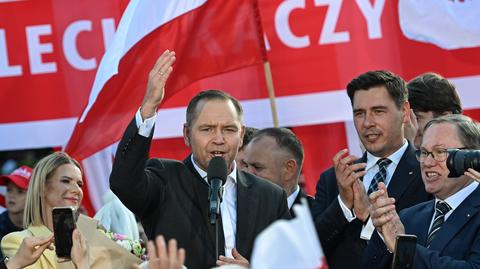Biznes Fakty
The Nawrocki Era. „A Cat and Mouse Game Awaits Us”

The outcome of the presidential election did not trigger a major upheaval in the market, but analysts remain realistic. Poland is entering a phase of political tension, where investor faith is at stake. Can the economy endure the strain between the Presidential Palace and the administration?
The National Electoral Commission disclosed the official results of the presidential election’s second round on Monday morning. Karol Nawrocki, the candidate endorsed by Law and Justice, emerged victorious with 50.89 percent of the votes. His opponent, Rafał Trzaskowski from the Civic Coalition, garnered 49.11 percent. Voter turnout was recorded at 71.63 percent.
No panic, but with uncertainty
The win of Karol Nawrocki in the presidential elections raises concerns regarding the future of Poland’s economy. While there was no catastrophic market decline, experts caution about potential strains between the Presidential Palace and the administration, which could influence investments, the exchange rate of the złoty, and the speed of reforms.
In the early hours of Monday’s trading session, the WIG20 index experienced declines of nearly 3%. By the end of the day, most of the losses were recovered, with the index closing down by 0.6%. Despite the initial uncertainty, the złoty even saw a slight increase in value by the afternoon.
Financial analyst Piotr Kuczyński stated in an interview with tvn24.pl that financial markets clearly had a preference for another candidate. „If Rafał Trzaskowski had become president, we would likely have seen a significant strengthening of the złoty and substantial gains on the stock exchange,” he remarked.
He also noted that Nawrocki’s election does not spell disaster. „The reaction in the currency market was moderate, even minor,” he commented. He pointed out that the downturns on the Warsaw Stock Exchange were partly influenced by global trade tensions, not solely a consequence of the election results. „In the case of the Stock Exchange, the election result’s impact coincided with unfavorable global sentiment, particularly related to Donald Trump’s announcements regarding increasing tariffs on steel and aluminum from 25% to 50%,” he explained.
Michał Stajniak, deputy director of the XTB analysis department, also shared with tvn24.pl that the market’s reaction to Nawrocki’s election was moderately negative. „Rafał Trzaskowski was viewed as a pro-market candidate, and Nawrocki’s ultimate victory is seen by investors as an increase in political risk,” he noted.
Like Kuczyński, he emphasized that the złoty’s behavior will not only be influenced by domestic political events. „In both the short and long term, the złoty will respond to the global situation and the expectations regarding interest rates in Poland,” he stated. „While a return of EUR/PLN above 4.30 cannot be ruled out, a rise above 4.40 would necessitate an open conflict between Poland and the EU, which, at least for now, should not occur,” he concluded.
Political chaos, economic consequences
Anna Gołębicka from the Adam Smith Center noted in an interview with tvn24.pl that the voting outcome signals a period of political gridlock. „We are entering a cat-and-mouse game. Whatever the coalition attempts will be obstructed by the new president. In terms of legislation, we can anticipate total blockage,” she assessed.
Several crucial projects are currently on the legislative agenda, including the proposal to reduce health insurance contributions for entrepreneurs. This was a significant electoral promise from the Civic Coalition and Poland 2050. The act was recently vetoed by President Andrzej Duda. The progress of reforms in the judiciary is also in jeopardy, as the European Commission is closely monitoring developments in this area.
Michał Stajniak, deputy director of analysis at XTB, warned that the greatest threat to the markets would be a political collapse. „Presently, the worst-case scenario for the Polish złoty and Polish shares would be a vote of no confidence in the government and early elections,” he cautioned. „Such a situation would not only create political chaos but may also result in the right-wing gaining power, which could be viewed negatively by the market,” he added.
„Another adverse scenario is the escalation of tensions with the EU, which desires to see progress in judicial reforms in Poland. If the judiciary reform in Poland fails, it could halt further disbursements of funds from the KPO, potentially leading to a depreciation of the złoty by several percent in the forthcoming months,” he stated.
The absence of KPO funds could also have severe economic repercussions. „It may impede economic growth in Poland due to a reduction in public investments, which could also deter private sector investments,” Stajniak explained.
 Karol Nawrocki Darek Delmanowicz/PAP
Karol Nawrocki Darek Delmanowicz/PAP According to Piotr Kuczyński, political
Źródło



